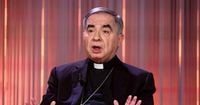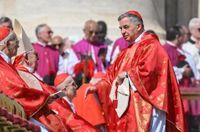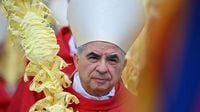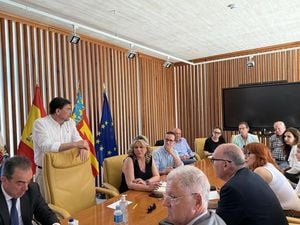As the Roman Catholic Church prepares for a significant transition, Cardinal Giovanni Angelo Becciu, who was convicted of financial crimes, has announced that he will not participate in the upcoming conclave to elect a new pope. This decision comes in the wake of the death of Pope Francis, which has set in motion a centuries-old ritual.
Cardinal Becciu, once a prominent figure in the Vatican hierarchy, was ordered by Pope Francis in 2020 to resign his cardinal rights amid a financial scandal. His conviction for embezzlement and fraud in 2023 marked him as the first cardinal to be tried by the Vatican’s criminal court. He received a five-and-a-half-year jail sentence but has maintained his innocence and is currently appealing the verdict.
The conclave to elect the new leader of the global Church will commence on May 7, 2025, following a closed-door meeting among cardinals at the Vatican on April 28, 2025. Since the death of Pope Francis on April 21, 2025, cardinals have been gathering in Vatican City, although speculation about the potential candidates remains rife.
Becciu's announcement on April 29, 2025, to withdraw from the conclave was a reversal of his earlier stance, where he had expressed a desire to participate. In his statement, he emphasized his commitment to obeying the will of Pope Francis, stating, "I have decided to obey, as I have always done, Pope Francis’ will not to enter the Conclave while remaining convinced of my innocence." This marked a significant moment, as the cardinal had previously indicated that he believed there was no explicit will to exclude him from the conclave.
The cardinal's case has generated considerable attention, not only because of his prominent role within the Church but also due to the implications of his potential exclusion from the conclave. The Vatican has categorized Becciu as a "non-elector," which has raised questions about the legitimacy of the conclave should he be barred from participating.
Becciu, who previously held the position of "sostituto" in the Holy See’s Secretariat of State, commanded significant influence within the Vatican. His responsibilities included overseeing the Church’s saint-making department, a role that gave him direct access to the pope. However, his involvement in a financial scandal led to his fall from grace.
The financial misconduct that led to Becciu's conviction involved the misappropriation of over half a million euros from Vatican funds, some of which were allegedly used to pay for the release of a Colombian nun kidnapped in Mali. Additionally, he has been accused of embezzling funds related to a disastrous real estate investment in London that cost the Vatican over €200 million.
As the conclave approaches, discussions among the remaining cardinals have turned to the challenges facing the Church. Cardinal Gregorio Rosa Chavez of El Salvador expressed optimism that the conclave could be resolved quickly, suggesting it might last only two or three days. This sentiment reflects a desire among the cardinals to maintain a sense of unity and purpose in the wake of Pope Francis's passing.
Amid the backdrop of Becciu’s withdrawal, the conclave will gather approximately 135 cardinals under the age of 80, who are eligible to vote for the next pope, a leader who will guide the 1.4 billion Catholics worldwide. The selection process is steeped in tradition, with cardinals convening in the Sistine Chapel to deliberate and ultimately elect the next pontiff.
The implications of Becciu's case extend beyond his personal circumstances. It has sparked debates regarding the legitimacy of the conclave and the potential influence of conservative factions within the Church, particularly as they navigate the legacy left by Pope Francis, who was known for his progressive views.
As speculation continues regarding the potential candidates for the papacy, the question of Becciu's exclusion looms large. Some conservative cardinals have suggested that a conclave that barred Becciu would be illegitimate, raising concerns about the future direction of the Church.
In his statement, Becciu expressed his commitment to serve the Church, stating, "I will continue to serve the Church with love, and I promise not to crash the conclave, in order to contribute to its communion and serenity." This pledge reflects a desire to prioritize the Church's unity over personal ambition, even as he faces the consequences of his past actions.
The upcoming conclave marks a pivotal moment in the history of the Catholic Church, as cardinals gather to elect a new leader amidst a backdrop of scandal, uncertainty, and the enduring legacy of Pope Francis. The decision of Cardinal Becciu to withdraw from the conclave adds another layer of complexity to an already intricate situation.
Ultimately, the conclave will not only determine the future leadership of the Catholic Church but also address the pressing issues that have arisen from financial scandals and internal divisions. As the cardinals prepare to cast their votes, the weight of history and the expectations of the faithful will guide their decisions.






